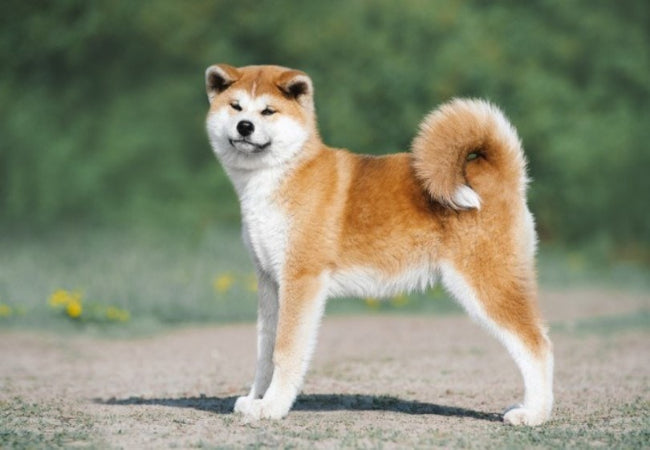Akita Guide: Health, Training & Vet Care for the Proud Guardian 🐶✨

In this article
Akita Guide: Health, Training & Vet Care for the Proud Guardian 🐶✨
By Dr. Duncan Houston BVSc
The Akita Inu, Japan’s revered national dog, is a breed of striking stature, dignity, and devotion. Known for their bear‑like presence and unwavering loyalty, Akitas are best suited for experienced owners who respect their independence and intelligence. Let’s explore how to properly care for an Akita with veterinary insight, daily logistics, and long-term wellness planning.
📜 Origins & Key Traits
Bred in Northern Japan to hunt boar, deer, even bear, Akitas are powerful, purposeful, and intelligent
Temperament highlights include:
- Strong loyalty to family, reserved with strangers
- Independent and sometimes stubborn—leadership is key
- High prey drive—dogs and cats may not be safe unless socialized early
- Calm, dignified, and clean—often described as cat-like in grooming habits
🏠 Suitability & Living Conditions
Akitas need structure: daily leadership, secure space, and no confusion about roles.
- Active households that provide ≥ 60 minutes of exercise daily—walk, run, hike, or play in a safely enclosed yard
- Owners willing to invest time in socialization, training, and consistent routine—even inside apartments
- Fenced yards to prevent zoom-offs—Akitas are confident explorers
✂️ Grooming & Coat Management
The Akita’s dense double coat is low-maintenance most of the year, but “blows” heavily twice annually.
- Brush 2–3× weekly using undercoat rake or slicker; increase to daily during shedding season
- Bathe infrequently—every 2–3 months—to maintain natural oils
- Check ears for debris; trim nails; brush teeth regularly; bath only when needed to avoid skin dryness
Tip: Use the Ask A Vet app to schedule grooming and log coat quality—this helps spot skin or coat issues early.
🍽️ Nutrition & Feeding Guidelines
Akitas require quality nutrition balanced for size and activity:
- Feed 3–5 cups of premium large-breed formula daily, split into two meals to reduce bloat risk
- Use elevated bowls and slow feeders to help prevent gastric dilatation‑volvulus (GDV)
- Include omega‑3 supplements to support coat and joint health; log weight and condition monthly
Tracking tip: Use Ask A Vet to follow weight trajectories and adjust diet before issues arise.
🏃 Exercise & Mental Engagement
Akitas thrive on purposeful activities:
- Daily brisk walks, hikes, or jogs; avoid off-leash in unsecured areas
- Provide enrichment: puzzle toys, scent work, obedience games, and mental tasks to prevent boredom
- Avoid dog park chaos—Akitas are best with structured, predictable exercise
🩺 Health Risks & Preventive Care
Typical lifespan: 10–13 years.
- Bloat (GDV)—major threat; reduce by diet management and post-meal rest
- Hip/elbow dysplasia—screen early with X-rays; add joint supplements or weight management
- Autoimmune conditions—including sebaceous adenitis and uveodermatologic syndrome; monitor skin, coat, eyes
- Progressive retinal atrophy & glaucoma—senior eye exams are essential
- Hypothyroidism & Addison’s disease—early bloodwork helps catch these
Proactive tools: Use Ask A Vet to set reminders for annual bloodwork, joint, and eye screenings; track vaccinations, supplements, and symptoms.
🎓 Training & Socialization
Positive, consistent training is a must for Akitas:
- Begin socialization early and train commands daily; use reward-based techniques and Woopf interactive toys ⏱️
- Short, varied sessions work best—Akitas tire quickly of repetition
- Teach recall firmly—mixed with structured exercise to prevent prey-driven escapes
- Log all training milestones in Ask A Vet to track progress and adjust methods
👪 Ownership Considerations
✅ Akita households work well if you:
- Have experience with large, strong-willed breeds
- Commit to moderate grooming and regular training
- Can provide security, structure, and boundaries
- Value loyalty and calm protection over lap-dog extroversion
❌ Consider shelters if: you have small pets, toddlers, or lack time for daily structure.
🧑⚕️ Final Words from Dr Duncan Houston
The Akita is a majestic, fiercely loyal companion—perfect for those who appreciate its independence, dignity, and heart. But these noble traits require purposeful care: exercise, grooming, health maintenance, and consistent leadership. With the modern tools of Ask A Vet, you can match this breed's grandeur with excellence in wellbeing.
Download the Ask A Vet app to track weight, health screenings, diet, and behavior for your Akita—and arm yourself with knowledge for long-term happiness and harmony.






